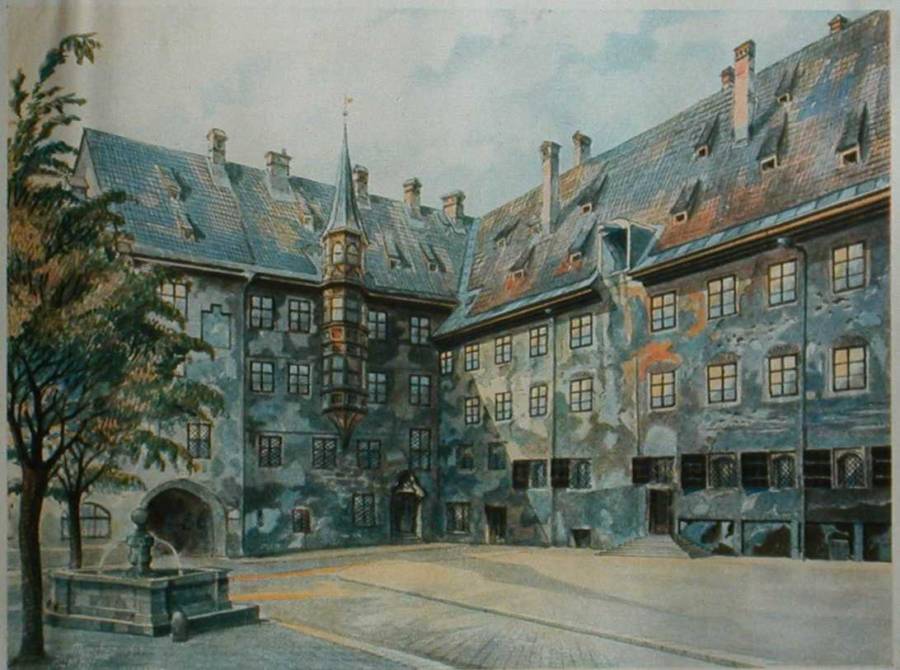What do modern-day Germans think if someone says, “Hitler was a monstrous tyrant but from a purely artistic perspective his paintings were quite nice?” (Or the art/music/literature of any other Nazi)
For Adolf himself? His watercolors were pleasant mediocrity. He had a small body of work, but he never really became a master of visual art. His real skill & his real passion was in what he wrote, in the story he told, through Mein Kampf & through speeches, of a great German race. I think it’s fair to say that he was a briliant writer of racist tracts, next to whom other racists of similar ambition seem dry & incompetent when they try to write or speechify. So as an author, as an orator, he was amazing but also destructive. It is important that we are inoculated against this craft, from possibly the greatest* artist of political terror *in the last century.
Have you ever tried to read Mein Kampf? It was heavily edited, otherwise it would be even more unreadable than it is. His speeches were memorable more for how they were delivered, and not for what he said. As for his art, he definitely had talent, but it was never cultivated. He could have been a successful theatrical designer, but he failed to take advantage of an opportunity he’d been offered.
Just recently his paintings failed to sell at auction.
But to be fair, is anyone really going to buy a Hitler painting at an auction and say, “But I really like his style!”
Even the person who’s only placing the bid for an anonymous collector would be lucky to get to the parking lot unmolested.
My German teacher read it in German and said it was pretty bad. Not just evil, but badly written. Hitler did not come off as overly intelligent.
He should have just painted and worked in the arts. We would have never heard of him or known his true feelings. Just another racist guy that slides along forgotten.
There’s nothing about his artwork that stands out in any way whatsoever, other than the notoriety of his name. With that being said, he was still a better artist than 99% of people. He had the fundamental techniques mastered. It takes way more creativity than that to be considered a great artist, but the vast majority of lay-people would not have a shot in hell of being able to paint or draw a generic landscape or cityscape from life as he could.
This doesn’t mean he had some kind of “gift” or innate talent. Being an illustrator is a job just like any other. He undertook the proper training and practice to be able to do it.
Disclaimer: I’ve never even seen any of his art. But even without having seen it, I’d be a little bit suspicious of anyone saying they thought he was a great artist. Yes, they might be saying that because that’s their genuine artistic assessment… but they might also be saying it for other reasons, and those other reasons are all too common.
If you can find it, Norman Spinrad’s The Iron Dream is about an alternate history Hitler who emigrated to the US and got work as a pulp SF illustrator and writer. His most popular book was Lord of the Swastika, others include The Master Race, The Thousand Year Rule, and The Triumph of the Will.
And some of the professors at Fine Art Academy did, in discussing his rejection, encourage him to consider going into architectural draftsmanship instead.
Most of his watercolors were of buildings around Vienna and Munich, and they’re not half bad (when he registered with the police in Munich, he listed his profession as “architectural painter”). His main problems seem to have been with perspective and human figures (the official reason for his rejection at the Academy of Fine Arts was “Too few heads” in the samples of his work he’d submitted). Years later, he remarked he was surprised that his works were fetching high prices, and complained that he still needed to learn how to paint properly.
(When he was living in a men’s home in Vienna, most of his paintings were done on picture postcards a partner hawked.)
Some samples:
http://s15858.pcdn.co/wp-content/uploads/sites/default/files/images/AHOrdensplatzCU1_0.jpg
At school, he had always had good marks in drawing, even while his other work suffered. Aside from that, it would seem he was self-taught.
Part of the book’s unreadability is due to it having been dictated, mostly to Rudolf Hess while they were both in prison after the Beerhall Putsch. It’s marginally more palatable if you approach it as a collection of speeches, rather than a serious attempt at a work of literature.
I read the book (or tried to, anyway) in college, for a class in Persuasion (as opposed to Argumentation). Part of its appeal (for those who found it appealing) was that it zeroed in on their basest instincts that they probably never would have openly expressed.
In an episode of The World at War, there was an interview with a former Nazi who remembered hearing Hitler speak for the first time, and the audience going wild as he reached the climax of his speech. Roughly, he said: “He’s speaking nonsense, and I know it’s nonsense. But what a shame that I can’t put that aside and share in what the audience is experiencing.”
